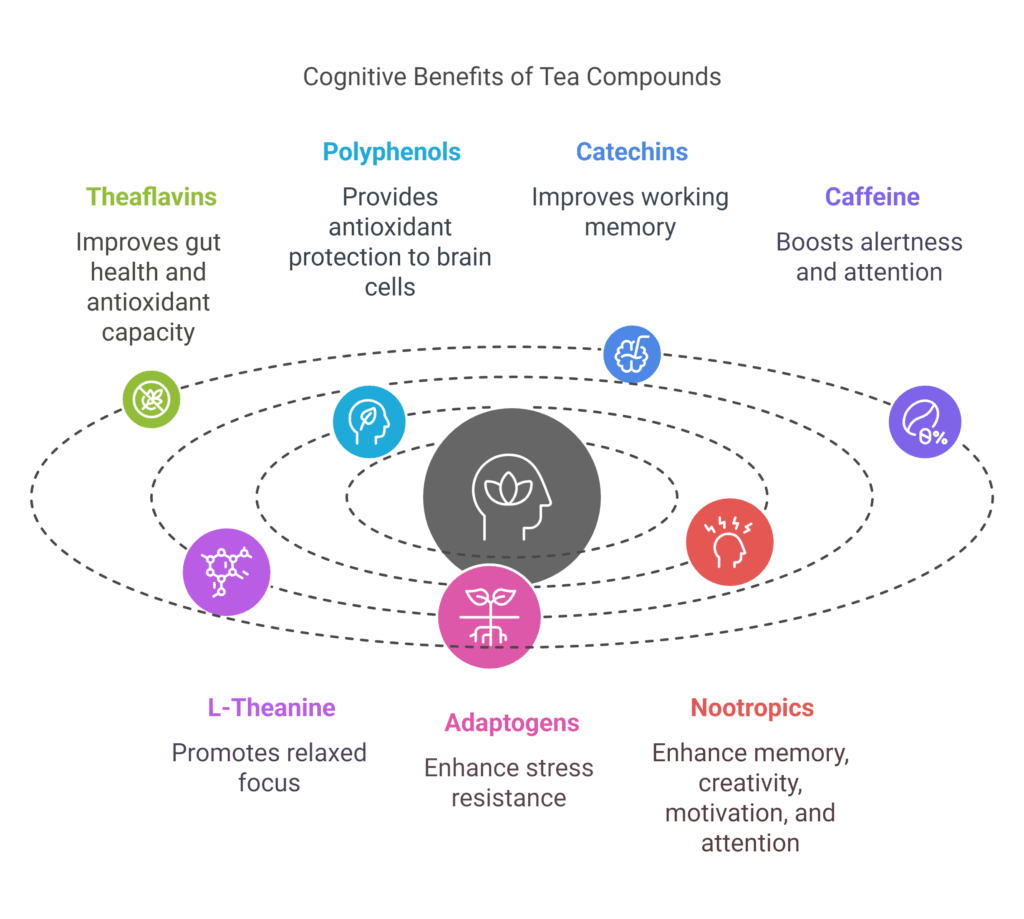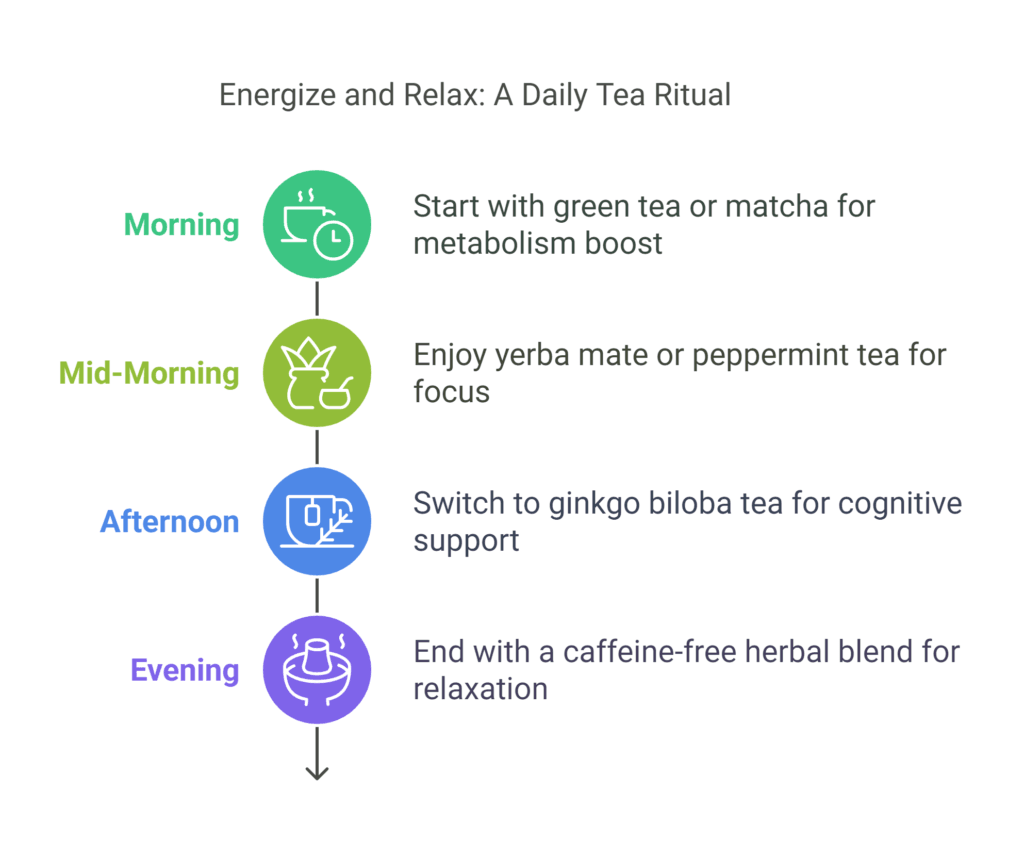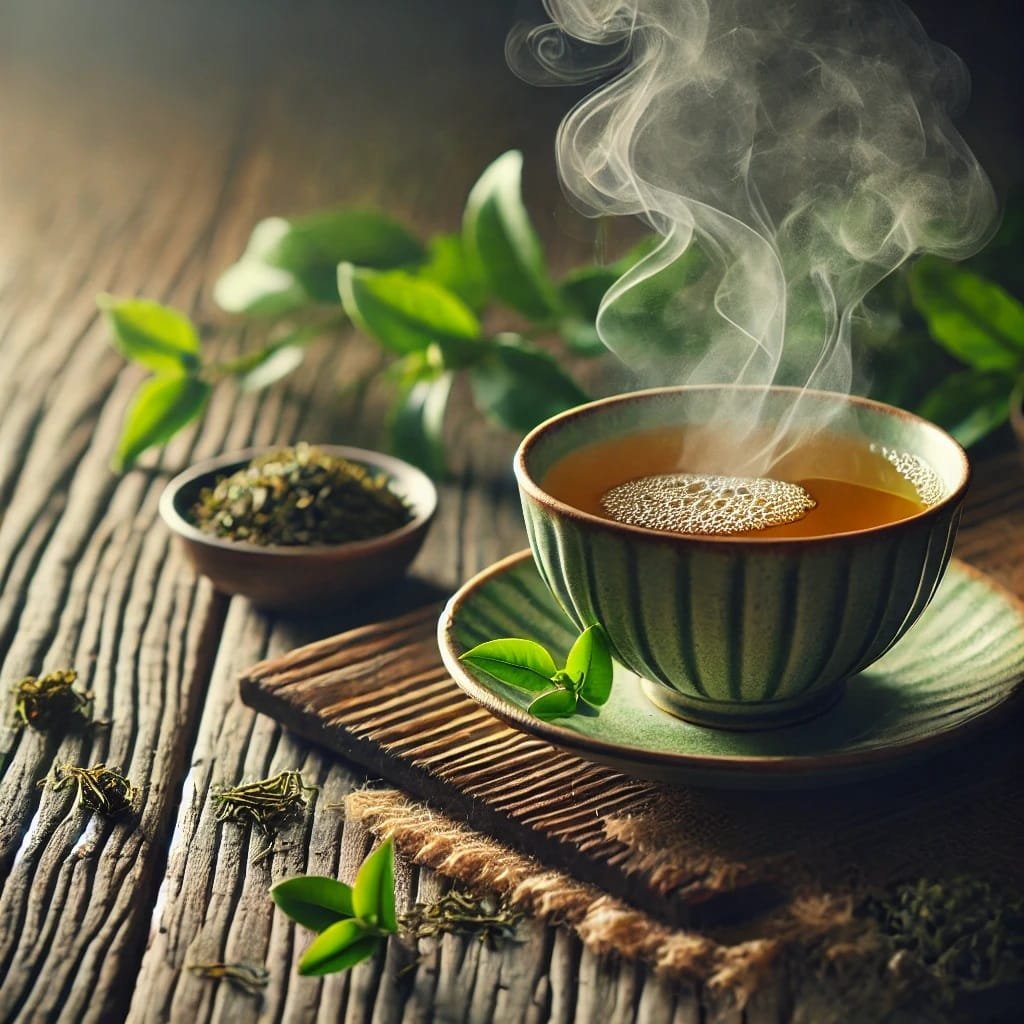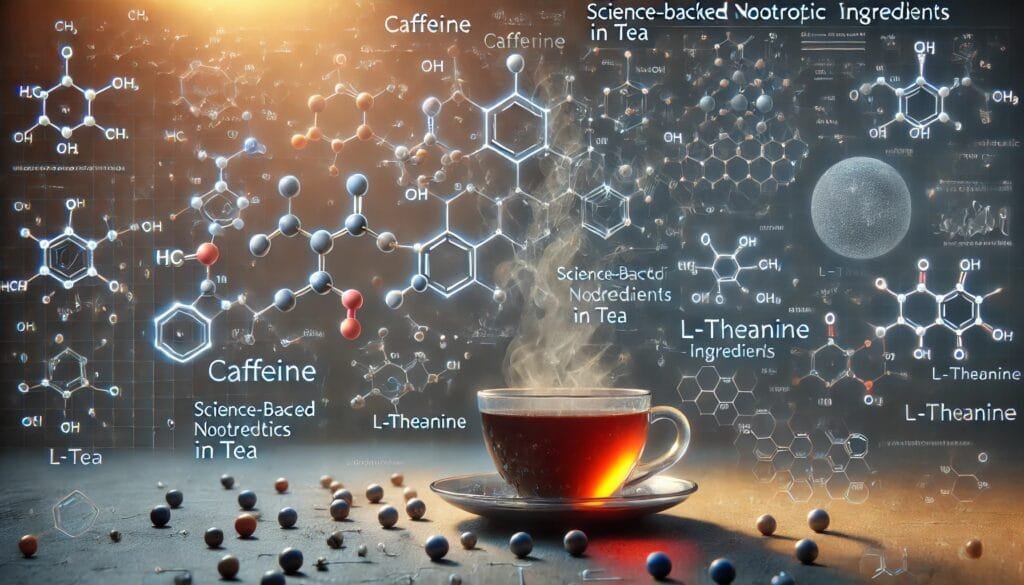Discover the transformative power of cognitive teas in this comprehensive guide. Learn what cognitive teas are, how their unique natural compounds work together to boost brain function, and receive expert-backed, practical tips for incorporating these teas into your daily routine. Backed by the latest scientific studies and verified sources, this post is your essential resource for enhancing focus, memory, and overall brain health naturally.
Introduction to Cognitive Teas
Cognitive teas are far more than a modern beverage trend—they are scientifically formulated blends that enhance mental clarity, boost memory, and support overall brain health. These teas combine premium tea leaves with beneficial herbs and adaptogens to provide a natural alternative to conventional stimulants. With roots stretching back to ancient traditions, cognitive teas were historically used to aid meditation, reduce stress, and improve focus. Today, modern research validates these traditional uses by demonstrating that specific compounds found in tea can significantly enhance cognitive function.
Moderate caffeine consumption, when combined with L-theanine, can enhance attention and memory, promoting a balanced cognitive state. L-theanine, an amino acid found in tea, is known for inducing a state of relaxed alertness, which can counteract the jitteriness often associated with caffeine.
In this guide, we explore the science behind cognitive tea’s benefits. We also provide practical tips to help you integrate these teas into your daily life. Whether you are a busy professional seeking a natural energy boost, a health enthusiast looking for a healthier alternative to coffee, or simply a tea enthusiast, this post delivers comprehensive insights and actionable steps. Every statistic, expert opinion, and claims in this guide are backed by verified sources to ensure accuracy and trustworthiness. By the end, you’ll have a solid understanding of how cognitive teas can become a cornerstone of your holistic approach to brain health.

Key Compounds in Cognitive Teas and Their Benefits
Cognitive teas are formulated with specific ingredients known for their potential to enhance mental and physical well-being. Key components such as theaflavins, polyphenols, catechins, l-theanine, and caffeine are often highlighted for their cognitive benefits.
Key Ingredients and Their Benefits
- Theaflavins: Found in black tea, theaflavins help mitigate aging-associated cognitive dysfunction through the microbiota-gut-brain axis. They improve gut health, enhance antioxidant capacity, and upregulate brain neurotrophic factors, contributing to cognitive improvements1.
- Polyphenols: These compounds, abundant in tea, are known for their antioxidative properties. They help prevent cognitive decline by addressing oxidative stress and inflammation, which are linked to aging and neurological disorders2 6.
- Catechins: Present in green tea, catechins have antioxidative and neuroprotective effects. They are associated with improved working memory and reduced risk of Alzheimer’s disease by preventing amyloid-beta plaque formation5 6 7.
- L-theanine and Caffeine: This combination, commonly found in green tea, enhances attention and cognitive performance. The combination of Caffeine and l-theanine significantly improves task-switching abilities and working memory3 4.
- Adaptogens: Adaptogens like ashwagandha and rhodiola have been shown to reduce stress and improve cognitive functions such as memory, attention, and mental processing speed. They work by modulating stress hormones and enhancing the body’s resilience to stressors8 9 10 11 12.
- Nooptropics: Nootropics improve various cognitive abilities, including memory, learning, and attention. They are particularly beneficial in conditions where cognitive functions are impaired, such as Alzheimer’s and other neurodegenerative diseases13 14 15
Recap of Key Compounds:
- Theaflavins: Improves gut health and antioxidant capacity
- Polyphenols: Provides antioxidant protection to brain cells, reducing oxidative stress.
- Catechins: Improves working memory
- Caffeine: Boosts alertness and attention by stimulating the central nervous system.
- L-Theanine: Promotes relaxed focus and counterbalances caffeine’s effects.
- Adaptogens: Enhance stress resistance and sustain cognitive performance.
- Nootropics: Enhance cognitive functions such as memory, creativity, motivation, and attention.
Together, these compounds form the backbone of cognitive teas, delivering a natural and holistic approach to brain health that is supported by scientific research and expert insights.

Top Cognitive Teas to Boost Brain Function
The world of cognitive teas is diverse, offering a range of options to suit every taste and cognitive need. In this section, we review several top cognitive teas renowned for their brain-boosting properties and provide detailed brewing tips and expert insights.
1. Green Tea: A Powerhouse of Antioxidants
Green tea consumption has been linked to improved cognitive performance and a reduced risk of neurodegenerative diseases. This is primarily attributed to the presence of catechins, particularly epigallocatechin gallate (EGCG), which exhibit neuroprotective properties. Its balanced blend of moderate caffeine and L-theanine provides a gentle, sustained energy boost that enhances concentration throughout the day.
Brewing Tip: Steep green tea in water heated to around 80°C (175°F) for 2–3 minutes to extract its full flavor and health benefits.
Research Highlight: Studies have linked regular green tea consumption with improved cognitive performance and a reduced risk of neurodegenerative diseases.
2. Matcha: Concentrated Benefits for Mental Clarity
Matcha, a finely ground green tea powder, is known for its potential cognitive benefits due to its high content of L-theanine, caffeine, and epigallocatechin gallate (EGCG). These compounds are associated with improvements in mood and cognitive performance.
Pro Tip: Whisk matcha powder with hot water until frothy for a traditional, invigorating experience that awakens both mind and body.
3. Ginkgo Biloba Tea: Enhancing Memory and Focus
Ginkgo biloba is widely recognized for its potential benefits in improving cognitive function and memory, particularly in the context of traditional medicine. Research has explored its efficacy in both healthy individuals and those with cognitive impairments, such as dementia and Alzheimer’s disease.
Usage Note: Clinical studies have shown that ginkgo biloba significantly enhances cognitive performance, particularly in older adults
4. Peppermint Tea: Refreshing and Invigorating
Peppermint tea is prized for its refreshing flavor and invigorating aroma, which stimulate the senses and help maintain focus. This tea is an excellent choice for a mid-day boost, reducing fatigue and enhancing alertness.
Fun Fact: Research suggests that the aroma of peppermint can improve memory and overall cognitive performance
5. Rosemary Tea: A Time-Honored Cognitive Booster
Historically associated with memory enhancement, rosemary tea offers a gentle cognitive lift. Its aromatic properties have been used for centuries to refresh the mind during extended periods of work or study.
Brewing Advice: Blend fresh rosemary with a base tea such as green tea to create a harmonious infusion that delivers both delightful flavor and cognitive benefits.
6. Yerba Mate: South American Energy Booster
Yerba mate is a traditional South American tea known for its robust flavor and high natural caffeine content. It provides a strong yet smooth energy boost, making it ideal for maintaining focus without the crash often experienced with other caffeinated beverages.
Serving Suggestion: Enjoy yerba mate in a traditional gourd with a metal straw (bombilla) or simply steep it as you would any other tea for a modern twist.
7. Custom Blends and Variations
Many tea enthusiasts create custom blends by combining several beneficial ingredients. For example, mixing green tea with matcha and adaptogens like ashwagandha can produce a multi-dimensional cognitive boost that is both flavorful and effective.
Expert Tip: Experiment with different ratios and consider adding extras such as lemon, ginger, or cinnamon to tailor your blend to your personal taste and cognitive needs.
Each of these teas offers unique benefits, and their variety ensures there is a perfect blend for every lifestyle and cognitive goal. Whether you need a gentle morning pick-me-up or a robust mid-day lift, these cognitive teas are designed to support brain health naturally and sustainably.

How to Incorporate Cognitive Teas into Your Daily Routine
Integrating cognitive teas into your daily routine can be simple and rewarding. With a few small adjustments, you can harness the benefits of these teas to enhance your mental performance and overall well-being.
Optimal Timing and Frequency
- Morning Kickstart: Begin your day with a cup of green tea or matcha. The combination of caffeine and L-theanine helps jumpstart your metabolism and primes your brain for the day ahead.
- Mid-Morning Boost: When energy begins to dip, a small serving of yerba mate or peppermint tea can help maintain focus and alertness.
- Afternoon Refresh: Instead of a traditional coffee break, opt for ginkgo biloba tea to sustain cognitive function without the jitters.
- Evening Wind-Down: Choose a caffeine-free herbal blend enriched with adaptogens to help relax and prepare your mind for a restful sleep.
Practical Strategies for Daily Integration
- Batch Preparation: Brew a large pot of your preferred cognitive tea in the morning and store it in a thermos or sealed container. This allows you to enjoy your tea throughout the day without constant brewing.
- Custom Blending: Experiment by mixing a base tea with additional herbs and spices. For example, blend green tea with a dash of matcha, fresh mint, and a pinch of ashwagandha for a personalized, energizing infusion.
- Mindful Rituals: Dedicate a few minutes each day to a tea ritual. Use this time to disconnect from digital distractions, savor the aroma and flavor, and engage in mindfulness. This not only amplifies the tea’s benefits but also serves as a moment of self-care.
- Pairing with Nutritious Snacks: Enhance the cognitive boost by pairing your tea with brain-friendly snacks like nuts, berries, or dark chocolate. These nutrient-rich foods complement the benefits of cognitive teas.
- Set Reminders: Utilize mobile apps or smart devices to schedule regular tea breaks throughout the day, ensuring a consistent routine.
By adopting these strategies, you can seamlessly incorporate cognitive teas into your daily life, transforming an everyday drink into a powerful tool for enhancing mental performance and overall health.

Potential Side Effects and Considerations
While cognitive teas offer numerous benefits, it is important to consume them mindfully and be aware of potential side effects.
Caffeine Sensitivity
Although the caffeine in tea is generally lower than that in coffee, individuals sensitive to caffeine might experience symptoms such as jitters, anxiety, or sleep disturbances. If these symptoms occur, consider switching to low-caffeine or decaffeinated tea blends.
Medication Interactions
Some herbal components—particularly adaptogens—may interact with prescription medications. If you are taking medication or have pre-existing health conditions, consult with your healthcare provider before introducing new herbal teas to avoid adverse reactions.
Recommended Intake and Moderation
For most people, one to two cups of cognitive tea per day are sufficient to reap the benefits without overwhelming the system. Overconsumption can lead to overstimulation or digestive discomfort.
- Pregnancy and Nursing: Individuals who are pregnant or breastfeeding should seek professional advice on tea consumption, as some compounds may require careful moderation.
- Quality Assurance: Always choose high-quality, organically sourced teas to reduce the risk of contaminants and maximize health benefits.
By understanding these considerations and monitoring your body’s response, you can safely enjoy the cognitive benefits of tea while minimizing any potential risks.
Frequently Asked Questions About Cognitive Teas

Final Thoughts
Cognitive teas embody a unique blend of ancient wisdom and modern science, offering a natural and delicious way to support brain health. Whether you’re looking to replace your morning coffee, enhance focus during work or study, or simply add a mindful ritual to your day, there is a cognitive tea blend that can meet your needs.
Related Resources for Further Exploration
This guide has provided the framework for making informed decisions about integrating cognitive teas into your lifestyle. Please be sure to check out our otherposts:
- Tea Product Reviews & Buying Guides for Cognitive Wellness
- Lifestyle Integration for Cognitive Performance
- Adaptogens & Brain Health
Ready to boost your brain health naturally?
Subscribe to our newsletter for updates on new blog posts, news, reviews, and guides.
Join Our Newsletter
Receive updates on new blog posts, news, reviews, and guides
Additional Resources and Final Thoughts
For those who wish to dive deeper:
- Explore More: Read our comprehensive Comparative Review of Cognitive Teas vs. Traditional Teas.
- Internal Links: Visit our posts on Brewing Techniques & DIY Tea Recipes and Science-Backed Nootropic Ingredients in Tea for further insights.
In a world where every sip matters, choosing the right tea isn’t just about flavor—it’s about enhancing your overall well-being. Whether you lean towards the innovative edge of cognitive teas or the enduring tradition of classic teas, your perfect cup awaits. Cheers to a brighter, more focused you!
Disclaimer: This article is for informational purposes only and does not substitute professional medical advice. Always consult a healthcare provider for any health concerns.
Sources
- Li, M., Zhang, C., Xiao, X., Zhu, M., Quan, W., Liu, X., Zhang, S., & Liu, Z. (2023). Theaflavins in Black Tea Mitigate Aging-Associated Cognitive Dysfunction via the Microbiota-Gut-Brain Axis.. Journal of agricultural and food chemistry. https://doi.org/10.1021/acs.jafc.2c06679.
- Shaukat, H., Ali, A., Zhang, Y., Ahmad, A., Riaz, S., Khan, A., Mehany, T., & Qin, H. (2023). Tea polyphenols: extraction techniques and its potency as a nutraceutical. , 7. https://doi.org/10.3389/fsufs.2023.1175893.
- Mancini, E., Beglinger, C., Drewe, J., Zanchi, D., Lang, U., & Borgwardt, S. (2017). Green tea effects on cognition, mood and human brain function: A systematic review.. Phytomedicine : international journal of phytotherapy and phytopharmacology, 34, 26-37 . https://doi.org/10.1016/j.phymed.2017.07.008.
- Einöther, S., Martens, V., Rycroft, J., & Bruin, E. (2010). l-Theanine and caffeine improve task switching but not intersensory attention or subjective alertness. Appetite, 54, 406-409. https://doi.org/10.1016/j.appet.2010.01.003.
- Baba, Y., Inagaki, S., Nakagawa, S., Kaneko, T., Kobayashi, M., & Takihara, T. (2020). Effect of Daily Intake of Green Tea Catechins on Cognitive Function in Middle-Aged and Older Subjects: A Randomized, Placebo-Controlled Study. Molecules, 25. https://doi.org/10.3390/molecules25184265.
- Fernando, W., Somaratne, G., Goozee, K., Williams, S., Singh, H., & Martins, R. (2017). Diabetes and Alzheimer’s Disease: Can Tea Phytochemicals Play a Role in Prevention?. Journal of Alzheimer’s disease : JAD, 59 2, 481-501 . https://doi.org/10.3233/JAD-161200.
- Zhang, R., Zhang, L., Li, Z., Zhang, P., Song, H., Yao, D., Cao, J., & Zhang, J. (2022). Green tea improves cognitive function through reducing AD-pathology and improving anti-oxidative stress capacity in Chinese middle-aged and elderly people. Frontiers in Aging Neuroscience, 14. https://doi.org/10.3389/fnagi.2022.919766.
- Dimpfel, W., Schombert, L., Keplinger-Dimpfel, I., & Panossian, A. (2020). Effects of an Adaptogenic Extract on Electrical Activity of the Brain in Elderly Subjects with Mild Cognitive Impairment: A Randomized, Double-Blind, Placebo-Controlled, Two-Armed Cross-Over Study. Pharmaceuticals, 13. https://doi.org/10.3390/ph13030045.
- Kuśmierska, M., Kuśmierski, J., & Kwaśniewska, O. (2024). Exploring the therapeutic potential of Ashwagandha (Withania somnifera) supplementation in alleviating stress and stress-related disorders. Quality in Sport. https://doi.org/10.12775/qs.2024.15.51854.
- Ruiz, I. (2024). Exploring the use of Ashwagandha (Withania somnifera) in stress reduction and cognitive function enhancement. International Journal of Herbal Medicine. https://doi.org/10.22271/flora.2024.v12.i5a.944.
- Altanova, A., & Korolyova, T. (2023). Efficacy of adaptogens in preventing and correcting stress-induced conditions. Human and nation’s health. https://doi.org/10.31548/humanhealth.2.2023.72.
- Panossian, A. (2017). Understanding adaptogenic activity: specificity of the pharmacological action of adaptogens and other phytochemicals. Annals of the New York Academy of Sciences, 1401. https://doi.org/10.1111/nyas.13399.
- Malik, M., & Tlustoš, P. (2022). Nootropics as Cognitive Enhancers: Types, Dosage and Side Effects of Smart Drugs. Nutrients, 14. https://doi.org/10.3390/nu14163367.
- Suliman, N., Taib, C., Moklas, M., Adenan, M., Baharuldin, M., & Basir, R. (2016). Establishing Natural Nootropics: Recent Molecular Enhancement Influenced by Natural Nootropic. Evidence-based Complementary and Alternative Medicine : eCAM, 2016. https://doi.org/10.1155/2016/4391375.
- Chiroma, S., Taib, C., Moklas, M., Baharuldin, M., Amom, Z., & Jagadeesan, S. (2019). The use of nootropics in Alzheimer’s disease: is there light at the end of the tunnel?. Biomedical Research and Therapy. https://doi.org/10.15419/BMRAT.V6I1.513.



